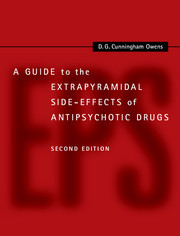Description
A Guide to the Extrapyramidal Side-Effects of Antipsychotic Drugs (2nd Ed.)
Author: Cunningham Owens D. G.
Addresses the major side-effects of one of the most widely prescribed drug classes in a light, readable style.
Language: English
Subject for A Guide to the Extrapyramidal Side-Effects of...:
Approximative price 156.60 €
In Print (Delivery period: 14 days).
Add to cart
Publication date: 04-2014
383 p. · 19.3x25.2 cm · Hardback
383 p. · 19.3x25.2 cm · Hardback
Description
/li>Contents
/li>Biography
/li>
It is often implied that antipsychotic-induced extrapyramidal side-effects are irrelevant to modern psychiatric therapeutics, rendered historic by newer, better treatments. This myth arises from limited awareness of the depth and breadth of neurological disruption antipsychotics can mediate. This volume discusses the extensive clinical boundaries of acute dystonias, drug-induced parkinsonism, akathisia and tardive dyskinesia, providing demographic and epidemiological context while illustrating how prescribing choices impact powerfully on their development. This new edition has been thoroughly updated and rewritten to include recent data, expanded references and a new chapter on the concept of 'atypical' antipsychotics. Written in a light, engaging style, liberally illustrated with clinical examples, it also invites readers to consider ongoing controversies - subjective drug effects, the relationship between 'akathisia' and restless legs, the status of the concept of 'atypicality', and so on. Informative reading for trainees as well as established practitioners in the fields of psychiatry, neurology, primary care and geriatrics.
Preface; Part I. Setting the Scene: 1. The origins of psychopharma; 2. Some preliminaries; Part II. The Syndromes: 3. Acute dystonias; 4. Parkinsonism; 5. Akathisia; 6. Tardive dyskinesia; Part III. Particular Issues: 7. Tardive and chronic dystonia; 8. Special populations; Part IV. Assessment: 9. The clinical examination; 10. An overview of some standardised recording instruments; Part V. Matters Arising: 11. Involuntary movements and schizophrenia: a limitation to the concept of tardive dyskinesia?; 12. And finally … the salutary tale of 'atypicality'; References; Index.
D. G. Cunningham Owens is Professor of Clinical Psychiatry, University of Edinburgh, and Honorary Consultant Psychiatrist, Royal Edinburgh Hospital, Edinburgh, UK.
© 2024 LAVOISIER S.A.S.




